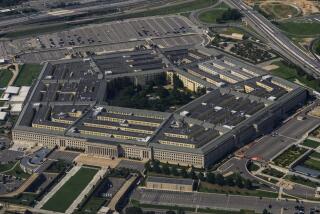U.S. Considers Charges for Military Tribunals
- Share via
WASHINGTON — Moving closer to holding military tribunals for captives from the war on terrorism, the Pentagon on Friday said it is considering a wide range of two dozen criminal charges that could be filed -- including murder, rape and poisoning.
U.S. military authorities disclosed the list because they are seeking input from the public this month before finalizing the types of charges and deciding which, if any, captives should be taken before a military commission.
The Pentagon insists it will conduct “full and fair legal proceedings” should a military commission be convened. For the last year, officials said, they have studied definitions of crimes in international treaties and conventions, domestic and international statutes, and judicial decisions. They wanted to sort out what might apply for U.S. military tribunals arising out of the war on terrorism.
“Over the past few months, the Department of Defense and other government lawyers have analyzed these sources of law and consolidated in a single resource a list of certain crimes,” said Whit Cobb, the Pentagon’s deputy general counsel.
“In the event that a military commission is warranted, this instruction will assist all participants -- including prosecutors, defense counsel, and military commission members -- to understand what constitutes an offense that is triable under the law of armed conflict,” Cobb said.
In the next two weeks, the Pentagon hopes to formalize its “Crimes and Elements for Trials by Military Commission,” after first hearing from the public about any other charges that should be considered or to raise questions about charges already on the list. The Pentagon is seeking responses through the Internet and by fax.
“This is a draft document and it’s not exhaustive,” cautioned one top-level official in the Pentagon’s general counsel’s office. “It doesn’t spell out every single crime that a military commission could try.”
About 1,000 people were reportedly captured during the war in Afghanistan and on other fronts after the Sept. 11 terrorist attacks on the Pentagon and World Trade Center.
About 650 of the prisoners are being held at the U.S. naval base at Guantanamo Bay, Cuba, while others, including many higher-level terrorism suspects, are in U.S. military custody in undisclosed locations.
Once the list of charges is finalized, the military will begin weighing which captives should be prosecuted, and where. While the naval base in Cuba is considered a logical spot for military tribunals, some could be held elsewhere if it is deemed unsafe to move prisoners.
Among the charges on the draft roster are attacking civilians, taking hostages, treachery and terrorism. Also listed are liability offenses, such as aiding and abetting a terrorist plot, and conspiracy.
Once the president designates an individual as subject to a military commission, military prosecutors would study the list to determine what charges should be filed.
Defense attorneys would work from the same list, looking for a case’s weaknesses. For instance some crimes, such as the attack on the U.S. destroyer Cole, could be argued as being military objectives rather than war crimes.
In other instances, there might be a legal debate over whether so-called human shields -- people who voluntarily travel to prospective bombing sites in an effort to ward off attacks -- are acting out of conscience or are committing war crimes.
The tribunals would be held before a military judge and jury.
Eugene R. Fidell, who as president of the National Institute of Military Justice has been closely monitoring the plans for tribunals, said the Pentagon is to be commended for drafting the list and seeking public input.
“I consider this a very important development in itself, and will contribute to public confidence in the ultimate process,” he said. “I think its greatly to the Department of Defense’s credit that they thought this would be worthwhile.”
He said the list reflects “an appreciation of the law of war as well as the evolving challenges” in the conflict against global terrorism.
“A lot of scholars are going to be burning the midnight oil to go through this list,” he said. “They will want to hold them side by side with existing doctrine.”
Fidell added that the drafting of the list is a clear sign that tribunals will be conducted at some point, even though the Pentagon has released a few captives from Cuba and is making accommodations that could lead to even more releases.
“I’ve had mood swings over whether any military commissions will be held,” he said. “Now I think there will be military commissions. And probably sooner rather than later. They’ve had a long time to interrogate detainees and glean what information they can.”
The list of possible criminal charges is available on the Internet at the Pentagon’s home page: www.defenselink.mil. The public can respond to the list by fax at (703) 614-4432.
More to Read
Sign up for Essential California
The most important California stories and recommendations in your inbox every morning.
You may occasionally receive promotional content from the Los Angeles Times.











